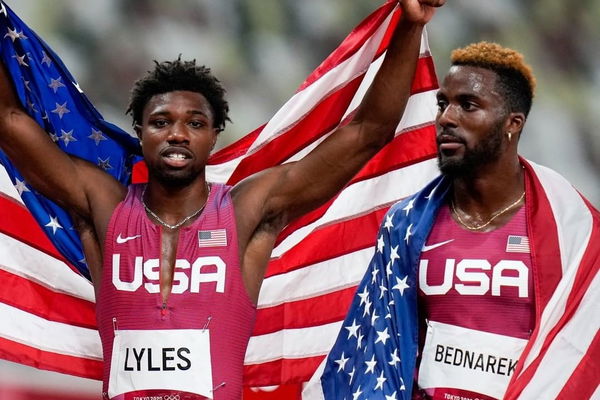

Participating in the Olympics can be a costly affair. “Being a track athlete living in the US… you are only cared about for four years and you’re in a dying sport,” Noah Lyles had once talked about the hardships of being an American track and field athlete. Expenses for pursuing the sport are on the higher side, and Lyles and compatriot Kenny Bednarek are bringing the issue to the fore.
After winning gold at the Bahamas World Relays, Wisconsin native Kenny Bednarek turned heads by finishing the men’s 200-meter sprint in 19.67 seconds at the Doha Diamond League, breaking Noah Lyles’ meet record. Meanwhile, at the Atlanta City Games, Noah Lyles set a new American record in the 150 m with a time of 14.41 seconds. But now that they are about to take part in that last stepping stone to the Paris Olympics (2024 U.S. Olympic Team Trials in Eugene, Oregon from June 21–30), both have to shell out thousands of dollars in expenses.
ADVERTISEMENT
Article continues below this ad
How do Olympics trials burn a hole in Kenny Bednarek and Noah Lyles’ pockets?
In a post on X on May 17, 2024, Kenny Bednarek highlighted the financial strain athletes face in gearing up for the 2024 U.S. Olympic Team Trials. He wrote, “The cost to fly and accommodate my team at the trials and Olympics is pretty wild. Prices are jacked up.”
Noah Lyles responded, “It’s hard for all of us man,” to which Bednarek replied,
“It’s crazy because that’s when we need our entire support system the most.”
The cost to fly and accommodate my team at the trials and Olympics is pretty wild. Prices are jacked up 🤯
— Kung Fu Kenny (@kenny_bednarek) May 16, 2024
Track Town, USA, is a two-hour drive from the nearest major city, Portland, with fewer direct flights compared to other cities. For Bednarek, a flight from Wisconsin to Oregon costs nearly $400 in addition to some road travel, and upscale hotels are upwards of $200 per night. This amount does not include costs for coaches, support staff, or family members. Similarly, for Noah Lyles, flying from Florida to Eugene costs approximately $300, with additional expenses pushing the total per person to over $1,000–$1,500.
Track and field athletes receive no financial support from USATF for accommodation and expenses during competitions, leaving those without sponsors to bear significant costs and adding to their financial burden during critical times in their careers.
ADVERTISEMENT
Article continues below this ad
Prize money wouldn’t solve the case; 16x gold medalist Michael Johnson suggests an alternative
On April 10, the World Athletics became the first international federation in history to announce prize money to 48 athletes at an Olympics, allocating a $2.4 million share from the revenue shared by the International Olympics Committee (IOC). It was reported that the gold medalist (48 track and field events) will be awarded $50,000 each and relay teams will receive $50,000 as a group. However, the silver and bronze medalists would have to wait until the 2028 Los Angeles Olympics to receive their incentives.
During this historic announcement the World Athletics President, Sebastian Coe had expressed, “It is important we start somewhere and make sure some of the revenues generated by our athletes at the Olympic Games are directly returned to those who make the Games the global spectacle that it is.”
However, the concerns of the athletes seem to be not just limited to just prize money, it is steered more toward how there is a lack of support throughout their career. Consider the following:
ADVERTISEMENT
Article continues below this ad
- Last year, ahead of the 2023 USATF Outdoor National Championship, top athletes voiced their concerns about travel and accommodation expenses. Olympic long jumper and 2024 World Indoor Champion Tara Davis-Woodhall also mentioned that her minimum airfare from Fayetteville, Arkansas, was around $1,200 last year.
- Even World bronze medalist, Janee Kassanavoid, estimated that sending one person cost her $3,200 at the Nationals.
- Adding to the financial strain, subscription streaming service Flo Sports secured the U.S. rights to the athletics’ Diamond League despite high subscription costs, with no direct financial benefits for the athletes. In contrast to the extensive travel undertaken by athletes across the globe to compete in the Diamond League, the compensation offered remains limited.
- The 2024 DL’s final event boasts a total prize pool of $60,000 per discipline, with the winner claiming $30,000 and the rest of the amount distributed among other finalists. Similarly, one-day qualification meets have a $30,000 prize pool per discipline, with winners awarded $10,000. Despite the exhaustive efforts and expenses incurred by athletes traveling around the world, the financial rewards remain pale in comparison to the challenges they overcome to compete.
- Michael Johnson believes that the sport needs to be reimagined. He tweeted, “Developing professional track is not the role of federations and they are not equipped for the job. Professional track must be developed by a private commercial entity focused on profitability. There is a basic profit formula for pro sports: QUALITY PRODUCT leads to FANS leads to MEDIA RIGHTS & SPONSORS leads to REVENUE. The athlete plays an important role in this. GREAT ATHLETES + GOOD COMPETITION = QUALITY PRODUCT. Athletes are key to the product and revenue comes back to athletes as compensation from the sport itself. Not just individual sponsors, as is currently the case.”
Despite the prize money announced for gold medal winners in Paris ($50,000 from World Athletics and $37,500 from the USOPC), athletes striving to reach Paris receive little support and must cover substantial expenses before they have a winning chance at an event. What are your thoughts on this disparity? Share your views in the comments below!
ADVERTISEMENT
ADVERTISEMENT
ADVERTISEMENT
ADVERTISEMENT

